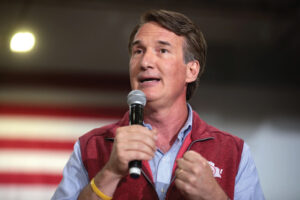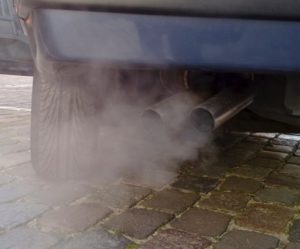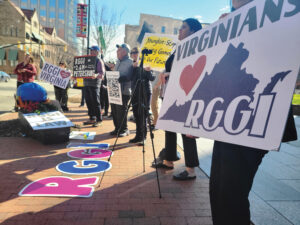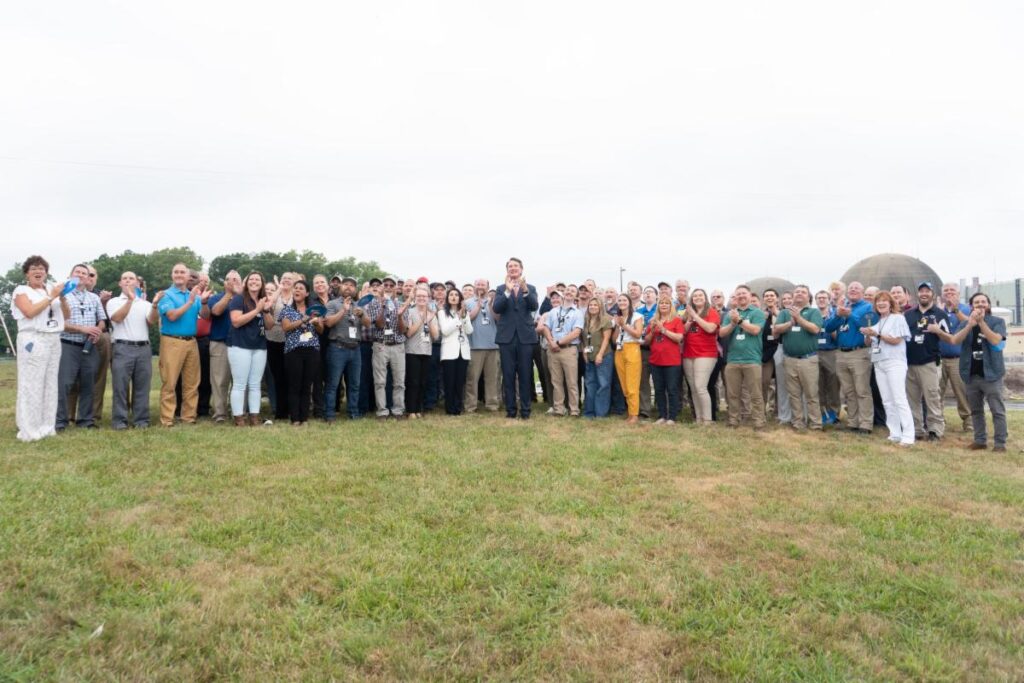
This year’s Scorecard ranks actions taken by this Administration since the publication of our last Gubernatorial Scorecard in the summer of 2023.
While Youngkin has continued a moderate commitment to land conservation and clean water infrastructure, both through funding and actions taken at the agency  level, he has continued a troubling trend of taking away proven tools to combat the climate crisis and put individuals with ties to the fossil fuel industry on bodies charged with regulating that industry in reining in pollution.
level, he has continued a troubling trend of taking away proven tools to combat the climate crisis and put individuals with ties to the fossil fuel industry on bodies charged with regulating that industry in reining in pollution.
Youngkin has also undermined our democracy and made a pivot to the far right of his party as he embraced Trump’s false election security claims and fanned the divisive flames of xenophobia.
 Grade: D
Grade: D
Justification: Youngkin’s environmental agenda is judged by actions or initiatives the Administration has taken to further or weaken environmental protection. Youngkin’s score here reflects some modest but positive steps forward on land conservation and water, and securing clean energy investment, but also a number of efforts that benefit polluters and endanger clean air through a walking back of the state’s climate commitments.
Budget
In December 2023, Youngkin introduced his first full budget as governor, which included upwards of $500 million of funding for clean water, resiliency, and other environmental projects. While actual funding levels varied in the final budget passed by lawmakers in May, these line items best represent Youngkin’s actual intent going into the regular session.
Key initiatives as announced by the Administration included:

“Energy Choice” Coalition
In September, Youngkin joined the “Governors’ Coalition for Energy Choice,” an initiative led by Louisiana Governor Jeff Landry and New Hampshire Governor Chris Sununu, who have both cast doubt on the scientific consensus around climate change. They are joined in this coalition by a “Who’s Who” of equally out-of-touch climate skeptics, including Georgia Governor Brian Kemp, Tennessee Governor Bill Lee, Wyoming Governor Mark Gordon, Indiana Governor Eric Holcomb, Oklahoma Governor Kevin Stitt, South Dakota Governor Kristi Noem, and Arkansas Governor Sarah Huckabee Sanders.
While “Energy Choice” may sound innocuous on the surface, it really just means “maintain our reliance on harmful fossil fuels for the foreseeable future.” Youngkin had previously joined many of the same GOP Governors outside of a diesel refinery in Louisiana to trash the Biden Administration’s climate and clean energy policies and efforts to transition away from fossil fuels, while pushing a long list of policy recommendations that were really just hand-outs to the oil and gas industry.
In Virginia, Youngkin has pursued what he calls an “All-of-the-Above” energy strategy, which would keep fossil fuels in our energy mix, invest in speculative and expensive emerging technology, and gut our clean energy targets.
Land Conservation Investments
In November of 2023 Youngkin announced nearly $15 million of funding from the Virginia Land Conservation Foundation (VLCF) for 29 projects that together conserve more than 55,000 acres of land. The funding includes land acquisition for new public recreation areas, tribal land reclamation, and projects on private forested and agricultural land that will yield benefits for water quality and biodiversity.
In October of 2024, Youngkin announced an additional land conservation investment of $3.9 million through the Virginia Battlefield Preservation Fund, which will go toward 10 different projects and protect more than 600 acres of battlefield lands associated with the American Civil War throughout the Commonwealth, including public access, signage and interpretation, and trails.
The Administration followed this round of funding in November as they announced an additional $14.4 million of VLCF funding that will go towards permanent conservation easements protecting 11,220 acres. The 28 projects covered under this round of funding include two land acquisitions for Virginia Tribes, new parks and public access points to the outdoors, and easements that will protect farms and timber tracts from any future development.
Green Bank or Slush Fund?
Across the country, states are receiving a record amount of funding from the federal level to advance clean energy projects and climate action. One of the ways this money has been making its way to states is through qualifying “Green Banks,” which can leverage public and private dollars and deploy those in the form of things like loans, equity investments, and credit support to local lenders for clean energy projects. In April, $5 billion of federal funds went out to states with qualifying green banks.
In an effort to capitalize on this funding, Senate Majority Leader Scott Surovell introduced legislation this year to establish a Green Bank in Virginia, which included provisions on how decisions would be made on funded projects and who would be making those decisions, namely a 12-member board of directors appointed by the Governor and the legislature.
Youngkin first amended the bill to require another vote in 2025, and then vetoed it after the Senate insisted on not wasting any further time to take advantage of available federal clean energy funds.
In late September, and in a somewhat hypocritical move, Youngkin went it alone and established a Green Bank using $10 million of seed money included in the state budget but tied to the initial legislation that he killed. The move left advocates and lawmakers scratching their heads with questions over whether Youngkin had the authority to do this, and little clarity on what types of projects will qualify for funding or how decisions will be made using these taxpayer dollars. It remains to be seen whether this entity will help support Virginia’s clean energy goals or simply be used as a slush fund for the emerging, unproven and costly technologies that may or may not ever actually produce electricity.
Slow Take on IRA Resources
The landmark Inflation Reduction Act (IRA) passed in 2022 has invested the most in our nation’s history in expanding clean energy and tackling climate change. To-date, and under Youngkin’s watch, very little of this investment has made its way to Virginia – the only state in the South with plans to reach 100% clean energy. According to Environmental Entrepreneurs (E2), which has tracked spending under the IRA, companies as of last spring have announced more than 300 major clean energy projects in 40 states and Puerto Rico, resulting in more than 105,000 jobs and upwards of $123 billion in capital investments. Of those, just four have landed in Virginia, projects connected to offshore wind, the emerging hydrogen industry and grid modernization. Virginia did receive a grant of $156 million for the Department of Energy’s Solar for All program, which will help fund residential rooftop and shared solar projects over the next five years for low-income residents and underserved communities.
Our neighbors to the South have seen far greater success landing big projects, though. According to E2, more than 40 projects have landed in the Carolinas while Georgia has secured nearly 30 – efforts that are helping those Deep Red states build a clean energy economy and create good-paying jobs.
Youngkin, however, has used his bully pulpit to deride the Biden Administration’s efforts to secure a clean energy transition, and given the opportunity to lure investment to Virginia, has rejected projects such as Ford Motor Company’s electric battery plant, which he called a front for the Chinese Communist Party. That project went on to be built in Michigan where it helped create nearly 2,000 jobs.
Putting BIL dollars to work
In November, the state announced a pair of big investments in Virginia funded by the Bipartisan Infrastructure Law (BIL) passed by Congress back in 2021.
The Virginia Department of Transportation (VDOT) announced $22 million for electric vehicle chargers at 35 different locations, the latest disbursements from $106 million made available to Virginia under the BIL’s National Electric Vehicle Infrastructure program. The fast-charging stations will have a minimum of four ports and be sited alongside highways and interstates. VDOT had already dispersed $11 million from the program back in March, bringing the total investment thus far to $33 million.
On Nov. 13, the Youngkin Administration announced that the company Microporous was investing $1.35 billion to build a manufacturing plant in the Berry Hill megasite near Danville – the same site previously rejected for the Ford project – where they will make battery separators for lithium-ion batteries, which are commonly used in EVs, energy storage systems, large industrial applications, and consumer electronics. The project is expected to create more than 2,000 jobs. In a press release distributed by the Governor’s office, Virginia’s U.S. Senators Mark Warner and Tim Kaine noted that $100 million from the BIL helped make the project possible.
Standing Up for Wetlands
In the wake of the Supreme Court’s ruling in Sackett vs. EPA, which greatly limited the number of wetlands applicable for protection under the federal Clean Water Act, David Schnare, a former EPA scientist and Trump transition team member with ties to anti-environmental right-wing think tanks, petitioned Virginia to weaken its own approach to regulating wetlands.
Instead of opening the door to increased pollution and giving a huge handout to industry, akin to how the Youngkin Administration has responded to climate and clean energy efforts, this petition was soundly rejected by the State Water Control Board in a huge win for clean water advocates and the Chesapeake Bay.
Putting Clean Cars in Reverse
 In early June, having already worked to repeal our state’s best tool to cut power plant emissions and invest in communities, Youngkin executed a second illegal climate action rollback in announcing that he would be taking Virginia out of the Advanced Clean Cars program effective at the end of 2024 – sticking Virginians with higher energy costs, dirtier air, and fewer options on what kind of car to drive.
In early June, having already worked to repeal our state’s best tool to cut power plant emissions and invest in communities, Youngkin executed a second illegal climate action rollback in announcing that he would be taking Virginia out of the Advanced Clean Cars program effective at the end of 2024 – sticking Virginians with higher energy costs, dirtier air, and fewer options on what kind of car to drive.
Virginia passed House Bill 1965 in 2021 mandating Virginia’s participation in the California-led initiative that requires a growing number of clean, in-demand electric vehicles to be offered for sale in participating states – a total of 17 states and the District of Columbia have adopted the standard to take steps above and beyond what the federal government requires under the Clean Air Act.
“Once again, Virginia is declaring independence – this time from a misguided electric vehicle mandate imposed by unelected leaders nearly 3,000 miles away from the Commonwealth.” Youngkin in the Virginia Mercury, June 5, 2024
Youngkin’s move to exit the program comes despite statutory language in the bill that the Air Pollution Control Board “shall promulgate final regulations for an Advanced Clean Cars Program” and “shall periodically amend any regulations adopted pursuant to this section to ensure continued consistency of such standards with the Clean Air Act.”
A 2022 Virginia Mercury article, published shortly after California announced an update of its standards, noted that Assistant Attorney General Michael Jagels had concluded in an email obtained by the outfit that Virginia was “statutorily and regulatorily aligned with California” because of the 2021 law and that legislative action would be required to change course. Republican-led efforts at the General Assembly to repeal this law have failed year after year, and the same Attorney General’s Office that issued that opinion in 2022 seemed to have a sudden change of heart in 2024 – an election year that saw Youngkin assailing President Biden’s clean energy policies.
“It’s been a while since I’ve seen that email,” Attorney General Jason Miyares told a Virginia Mercury reporter at a press conference held at a Richmond area Toyota dealership with a backdrop of full-size pickup trucks.
Pollution from the transportation sector makes up more than half of Virginia’s total carbon footprint, making it the Commonwealth’s largest driver of climate change and a major threat to public health. Emissions from dirty, outdated cars disproportionately harm low-income communities and communities of color. Without this standard and the gradual shift to pollution-free vehicles, these communities will continue to bear the brunt of dirty air and respiratory illness. The Advanced Clean Cars Standard paves the way for us to avoid nearly $30 billion in healthcare costs and 2,700 premature deaths.
The illegal rollback will also likely have economic repercussions. Just like he did in rejecting Ford Motor Company’s multi-billion dollar EV battery manufacturing plant in Southside, Youngkin is sending electric vehicle jobs and investment to other states. Without this standard, Virginia will lose EV sales to states like Maryland, impacting nearly one-third of the prospective car market in the state – demand that’s growing due to record consumer incentives – while also losing out on related investment in EV infrastructure.
With Youngkin rolling back our state’s Advanced Clean Cars Standard and also our membership in the Regional Greenhouse Gas Initiative, a multi-state cap-and-invest program that cuts power plant emissions while investing in energy efficiency and flood resiliency programs, he has taken away two of our best tools to combat climate change and keep communities safe from pollution while offering no plan of his own to cut pollution or do anything at all to show that he takes the climate crisis seriously.
 Grade: F
Grade: F
Justification: Youngkin continued a trend of stacking boards and commissions with pro-polluter allies and political operatives while taking no executive actions to push the ball forward on the environment. His attacks on voting rights through executive order were especially egregious in the weeks leading up to the presidential election.

RGGI Repeal Leads to Dirtier Air
In November a Circuit Judge finally issued a ruling that it was indeed unlawful for Youngkin to roll back Virginia’s participation in the Regional Greenhouse Gas Initiative – notching a huge win for environmentalists who had argued this move was illegal from day one.
RGGI has been one of Virginia’s best tools to combat climate change ever since lawmakers passed legislation to join the compact back in 2020 – laws that Youngkin tried to circumvent and continues to ignore.
When Virginia was in the program, we saw carbon pollution from power plants drop by more than 20% and state coffers grow by more than $830 million.
With Virginia’s participation in RGGI now on hiatus, the impacts of Youngkin’s decision to target this program are coming into better view.
Not only do we have less revenue to invest in energy efficiency programs that cut energy bills for Virginians, and mitigation efforts that prevent the type of catastrophic flooding that we saw this Fall with Hurricane Helene, our air is dirtier.
Comparing the first quarter of 2024 when we weren’t in RGGI to the previous year, power plant pollution has increased by nearly 30%.
Pro-Polluter Appointments
State Air Pollution Control Board: The State Air Pollution Control Board now exists entirely of Youngkin appointees. Members appointed since our last Scorecard include Kimberly Beamer, Russell Mait, Daniel Jorjani, and Emily Domenech.

Jorjani’s appointment was especially egregious. Currently employed by Citizens United, the conservative dark money group that successfully sued the federal government to expand corporations’ influence over elections, Jorjani has a career filled with putting polluters first.
Jorjani was appointed Solicitor of the U.S. Department of the Interior in 2019 under the Trump Administration. He had previously served as Principal Deputy Solicitor for Interior since May of 2017 and worked in various capacities at the Department of Interior under the George W. Bush Administration. At DOI under Trump, Jorjani aided in that Administration’s unprecedented environmental attacks, including signing two orders to significantly benefit the mining, oil, and gas industries. The first was a rollback of an Obama Administration decision to prevent the development of a copper and nickel mine bordering the Boundary Waters Canoe Area Wilderness in northern Minnesota. The second reversed a prior interpretation of the Migratory Bird Treaty Act, which had allowed federal officials to prosecute companies who kill birds during their business activities. His non-governmental work included a key role at Freedom Partners, a group linked to the Koch Brothers that has consistently advocated to “remove impediments” to fossil fuel production. He had also worked for the Charles Koch Institute and Charles Koch Foundation as a director of research and held roles advising clients on energy development in Russia and Central Asia.
Emily Domenech is Senior Vice President of Boundary Stone Partners, a lobbying firm that represents a number of energy companies. She previously served as a Senior Policy Advisor to House Speakers Mike Johnson and Kevin McCarthy – both of whom have worked to dismantle federal climate action initiatives. Prior to that Domenech worked in various capacities in the House Committee on Science, Space and Technology related to energy and the environment, was a Legislative Director for Texas Congressman Randy Neugebauer, and a Policy Advisor to Rick Perry’s presidential campaign.
The remaining two appointees come from backgrounds unrelated to air regulation or energy. Russell Mait has a background in the chemical and aluminum industry, and currently has a consulting firm focused on chemical management. Kimberly Beamer is an attorney in Roanoke.
Board of Conservation and Recreation: Youngkin appointed former Virginia Secretary of Natural Resources Doug Domenech – father to Emily Domenech who was named to the Air Board – to the Board of Conservation and Recreation (BCR) in October. The BCR’s duties include advising DCR’s Director on parks master plans; reviewing designations for scenic rivers, highways and byways; and reviewing requests for funding of outdoor recreation facilities, among others.
In addition to being Secretary of Natural Resources in the McDonnel Administration, Domench also served in the Trump Administration’s Department of the Interior and prior to that led the Koch Brothers-backed Texas Public Policy Foundation’s “Fueling Freedom Project” aimed at defeating the Obama Administration’s Clean Power Plan. While serving in the corruption-riddled Trump Administration, Domenech was the subject of multiple ethics violations investigations, including using his post to help get his son-in-law a job at EPA and meeting with his former employer, the Texas Public Policy Foundation, to discuss legal disputes between that organization and DOI.
Virginia Marine Resources Commission: In September 2023 Youngkin appointed outgoing State Senator John Cosgrove as Deputy Commissioner of the Virginia Marine Resources Commission. A former partner in a marine construction company with an engineering background, Cosgrove was one of a number of lawmakers who retired ahead of the 2023 elections rather than run in a new district.
Cosgrove had a 43% career score from Virginia LCV and a 29% in his last year in the Senate.
Cosgrove had previously carried legislation moving the management of menhaden from the legislature to the VMRC, where it now rests thanks to legislation that passed in 2020 (Cosgrove’s legislation was incorporated into the final bill that passed). Menhaden had long been a political flashpoint at the legislature due to a large industry presence in the Northern Neck where the small, oily fish are converted into a variety of consumer products, and concerns from conservation groups that the fish were being overharvested and impacting the Bay ecosystem.
Over the summer, the VMRC made the controversial move to lift the winter crab dredge, which it later reversed after significant community and advocacy backlash. Had this action stood it could have been detrimental to crab populations as winter harvesting greatly targets females.
Virginia Environmental Justice Advisory Council: Virginia’s Council on Environmental Justice was solidified as a permanent fixture of Virginia government in 2020, when Governor Northam signed legislation making the 27-member Council an official advisory body to the executive branch (it had previously existed under an Executive Order) and tasked with advising the Governor and providing recommendations “to protect vulnerable communities from disproportionate impacts of pollution and provide such communities meaningful involvement in the decision-making process.”
Youngkin has taken a drastically different approach to environmental justice.
After failing to appoint members to fill vacancies on the Council, making it difficult for the Council to have a quorum to meet and do its business, the General Assembly attempted to push Youngkin’s hand with legislation requiring him to appoint new, qualified, members to the body.
Youngkin vetoed the bill and responded in kind in March by appointing individuals from the waste, fossil fuels, energy, and road construction industries.
These included: Lisa Kardell, director of public affairs for Waste Management; Courtney Malveaux, a waste industry lobbyist; Eddie Ramirez, who runs a road construction business; Morgan Whayland, a lobbyist for Virginia Natural Gas, and Ronald White, vice president of Southside Electric Cooperative.
In September the Administration made a second round of appointments to the body that were more in line with its purpose, adding former Air Board member and environmental justice advocate Hope Cupit (who he replaced on the Air Board with a Republican operative) and Eureka Tyree, a member of the Cumberland County Board of Supervisors, to the Council.
“I’m a conservationist…We have done more investing in our last two-and-a-half years in promoting the long-term interests of the Chesapeake Bay and rivers and streams and air quality in the commonwealth of Virginia than any other administration in the history of the state, in my view.” Youngkin in the Virginia Mercury, July 19, 2024
Voter Roll Purges
In August, Youngkin issued an Executive Order directing the Virginia Department of Elections to update the state voter rolls daily – a process that included comparing lists of people who had registered to vote with lists at the Department of Motor Vehicles that identified people as noncitizens. The move resulted in purging the rolls of 6,300 Virginians. A Washington Post investigation revealed that there was no evidence to support Youngkin’s claims of non-citizens trying to vote in the 2024 election, and that most of the voters purged by the Youngkin Administration simply made paperwork errors at the DMV.
Still, Youngkin – following the cue of former President Donald Trump and other Republican governors – fanned the flames around illegal immigration, saying in a telephone town hall with Trump that, “noncitizens will be prosecuted if they vote,” while Trump reiterated his often xenophobic, extreme rhetoric toward immigrants and false claims that Democrats were trying to steal the election.
“Call me crazy, but I think American elections should be decided by American citizens and Virginia elections should be decided by Virginians.” Youngkin on Fox News’s “Hannity,” Aug. 7, 2024
Noncitizens are already barred from voting under existing Virginia law. And of the three illegal voting cases that have been prosecuted since Youngkin assumed office, none involved a question of citizenship.
In October, the U.S. Department of Justice sued Virginia to halt any further purges, citing federal law that bars blanket voter purges within 90 days of an election. Assistant Attorney General Kristen Clarke of the Justice Department’s Civil Rights Division said in a statement that, “by canceling voter registrations within 90 days of Election Day, Virginia places qualified voters in jeopardy of being removed from the rolls and creates the risk of confusion for the electorate. Congress adopted the National Voter Registration Act’s quiet period restriction to prevent error-prone, eleventh hour efforts that all too often disenfranchise qualified voters. The right to vote is the cornerstone of our democracy and the Justice Department will continue to ensure that the rights of qualified voters are protected.”
In a statement in response to the lawsuit, Youngkin called the action politically motivated and pledged to push back.
“Virginians – and Americans – will see this for exactly what it is: a desperate attempt to attack the legitimacy of the elections in the Commonwealth, the very crucible of American Democracy,” he said.
Ultimately, DOJ’s lawsuit was upheld by a federal court and an appeals court before being stayed by the U.S. Supreme Court just days before the 2024 Presidential Election, resulting in the likely disenfranchisement of hundreds of Virginians and sowing confusion in our elections.
Slow-walking Rights Restoration
Virginia is one of the only states in the Union that doesn’t restore rights to citizens when they return to society post-felony incarceration, a remnant of racist Jim Crow laws intended to impede the right to vote for Black Virginians. Under our current process, these individuals have to petition the Governor to have their rights restored. And while some Administrations have made this an automated process, under Youngkin we’re seeing the lowest level of rights restoration in more than a decade as the Administration takes petitions up under an opaque case-by-case basis that has been the subject of litigation. In 2022 and 2023 Youngkin restored rights for 4,300 and 2,500 Virginians, respectively. Figures for 2024 have not yet been made public, but Youngkin would have a long way to go to come close to any of his recent predecessors in office. Governor Northam and Governor McAuliffe restored rights to nearly 300,000 individuals combined. Bob McDonnell, the most recent Republican to hold office prior to Youngkin, implemented the first internal automatic rights restoration process.
The Youngkin Administration did create a reentry program under Executive Order 36 called “The Stand Tall – Stay Strong – Succeed Together Initiative” which focuses on employment, benefit enrollment, reentry programming, parenthood and public safety efforts – but not voting – making it a big missed opportunity to make voting rights part of the reentry process.
The result of Youngkin’s sluggish response to rights restoration is widespread disenfranchisement for individuals who are reentering society – approximately 5% of the eligible voting age population and made up disproportionately of Black Virginians.
 Grade: D-
Grade: D-
Justification: While Youngkin did sign into law several good pieces of environmental legislation and improved a couple of bills, he was incredibly heavy with his veto pen and weakened a number of bills and budget measures.
Vetoes
With Democratic majorities in place in both the House of Delegates and Senate of Virginia, Youngkin vetoed a record 201 bills this year, up from eight in 2023 and 33 in 2022. Environmental legislation was not spared, including the following 13 bills that Virginia LCV and the broader environmental community supported:
House Bill 47 from Delegate Holly Seibold and Senate Bill 306 from Senator Saddam Salim: The bill would require retailers to notify consumers whether a plant for sale was an invasive species.
House Bill 208 from Delegate Shelly Simonds and Senate Bill 595 from Senator Lamont Bagby and Senator Laschrecse Aird: Would enable localities to adopt a healthy communities strategy as part of the comprehensive planning process, giving municipalities another tool to address local environmental threats.
House Bill 1177 from Delegate Mark Sickles and Senate Bill 606 from Senator Schuyler VanValkenburg: Directed the state to rejoin the Electronic Registration Information Center (ERIC), a non-partisan, multistate organization that maintains voter rolls and encourages eligible voters to register.
House Bill 645 from Delegate Atoosa Reaser: Required signage to be in place for parking spots reserved for electric vehicle charging before a fine could be levied to drivers of non-electric cars or those not actively charging who park in those spaces.
House Bill 949 from Delegate Alfonso Lopez: Compelled operators of qualifying facilities that store hazardous substances above ground to submit a facility response plan for worst-case discharges to DEQ – providing additional protections that would not otherwise be required under an upcoming Federal rule regulating aboveground storage tanks.
House Bill 950 from Delegate Alfonso Lopez: Would prohibit the governor and Board of Housing and Community Development from weakening statewide building codes, including energy efficiency requirements, before Virginia’s next code development process.
House Bill 1088 from Delegate Betsy Carr: Would require the Virginia Board of Education to provide materials on climate change and environmental literacy to local school boards that are based on scientific, peer-reviewed source material.
House Bill 1100 from Delegate Betsy Carr: Would allow all localities in Virginia to adopt tree conservation and preservation ordinances. Currently, only cities in Planning District 8 (Northern Virginia) are allowed to do so.
Senate Bill 276 from Senator Ghazala Hashmi: Would have studied the feasibility of utility-provided rooftop solar or energy storage projects, on the condition that the equipment result in cost-savings to customers.
Senate Bill 729 from Senator Scott Surovell: Would have established a “Green Bank” in Virginia to leverage federal dollars to invest in qualifying clean energy projects.

Amendments
Youngkin sent down amendments to several pieces of legislation as well as a number of budget amendments during the regular session.
Two of Youngkin’s amendments either improved the bill or were benign enough that we asked legislators to accept them as a compromise:
House Bill 285 from Delegate Delores McQuinn: This legislation gives localities and transit agencies fast-track authority to install shelters and benches at bus stops, ensuring that bus riders have safe, dry, and shaded protection from the weather. Youngkin’s amendment extends the existing sunset clause from 1 year to 3 years – allowing enough time for the “Better Bus Stop” program to be fully and effectively implemented before the legislature reconsiders making it a permanent policy.
House Bill 746 from Delegate Michael Webert and Senate Bill 565 from Senator Creigh Deeds: This legislation directs the SCC to develop the greatest utility scale energy efficiency targets deemed feasible and cost-effective, and calls for one streamlined cost-effectiveness test for the Commission to use when assessing utility energy efficiency programs. The Governor’s amendment preserved the original bill but added in one additional cost-effectiveness test (Total Resource Cost) as a second test for the SCC to use when evaluating energy efficiency programs.
We urged lawmakers to reject Youngkin’s amendments to the following legislation:
Senate Bill 729 from Senator Scott Surovell: This legislation would have filled a critical gap in accessing billions of dollars federal clean energy funding with a “Green Bank,” a state financing entity for qualifying clean energy and climate resiliency projects. Youngkin’s amendment required lawmakers to take up the issue again in the 2025 legislative session – possibly too late to access eligible funding. After lawmakers rejected this amendment, he vetoed the bill.
House Bill 950 from Delegate Alfonso Lopez: This legislation prohibited the governor and Board of Housing and Community Development from weakening statewide building codes, including energy efficiency requirements, before Virginia’s next code development process.The Governor’s amendment would require agency oversight from the Board of Housing and Community Development before any legislation relating to the building codes could be adopted. After lawmakers rejected this amendment, he vetoed the bill.
In addition to his amendments to legislation, Youngkin sent down more than 200 amendments to the conference budget that advanced during the regular session. We urged lawmakers to reject the following anti-environmental amendments:
Amendments #37 & #38: Cuts and undermines parking lot and rooftop solar initiatives under the Department of Housing and Community Development’s Enterprise Zone grants and Industrial Revitalization Funds.
Amendment #143: Eliminates $500,000 of funding for the Office of Commonwealth Resilience.
Amendments #144; #145; #151, #233: Reduces funding for clean water initiatives, including eliminating staff to support agricultural best management practices, removing $2 million for Virginia Soil and Water Conservation Districts, cutting $15 million from a “Pay for Outcomes” pollution reduction pilot program, and (#233) removing $300 million from wastewater bond allocations.
Amendment #146: Cuts nearly in half the Department of Conservation and Recreation Natural Heritage Program ($593,000 to $300,000).
Amendment #148: Reverses the General Assembly’s decision to move up the effective date of prohibiting polystyrene “styrofoam” food containers – 2025 for large chain restaurants and 2026 for smaller establishments.
Amendment #152: Strips out language directing Virginia to get back into compliance with existing law and take the necessary steps to rejoin the Regional Greenhouse Gas Initiative within 90 days.
Amendment #179: Cuts the minimum appropriation needed to cover Virginia’s share of funding to close METRO’s operating funding gap by 76%, allocating no money in FY25 and just $35 million in FY26, and adds language requiring a set of studies already called for under a resolution adopted by the General Assembly.
Amendment #187: Eliminates $10 million to establish and provide seed funding for a Virginia Clean Energy Innovation Bank – a state authority established to leverage federally-supported financing at below-market rates to encourage private capital to invest and innovate in Virginia.
 Grade: F
Grade: F
Justification: Youngkin’s preference for soundbites over substance has not only continued, but worsened over the past year as he preferred partisan politics over practical governance.
Youngkin has continued a trend of putting political theater above practical governing, and has not improved how his Administration interacts and collaborates with the legislative branch. This year’s drawn-out budget process exemplifies this well.
Youngkin had long kept Trump at arm’s length, but this year saw him fully embrace the President-elect, speaking alongside Trump at multiple rallies, and campaigning for him, a long cry from when Youngkin was conveniently out of town attending a basketball game when Trump campaigned in Virginia last March around the Super Tuesday primaries.
“Give them the strength to allow their message to be heard. Wipe the scales off of voters’ eyes so that they can see truth.” Youngkin at a Trump rally in Salem on Nov. 2., VPM
Youngkin’s also made a fairly significant lurch to the right, as he echoed many of the false claims of voter fraud and anti-immigrant sentiment.
This is incredibly concerning as Trump enters office for a second term. Due to its proximity to Washington, D.C., Virginia is home to a massive federal workforce. Will Youngkin defend Virginia when Trump decimates the federal workforce and erases entire agencies, as called for in Project 2025? Will Youngkin go along with massive cuts to EPA and an undermining of the Chesapeake Bay cleanup, or will he stand up for our state’s environment?
Time after time, Youngkin has based his decision-making on political expediency, not what’s right for the state he represents. We sincerely hope that Youngkin will find political courage over the coming year, but are bracing to wage the fights for our environment that Youngkin won’t himself wage.